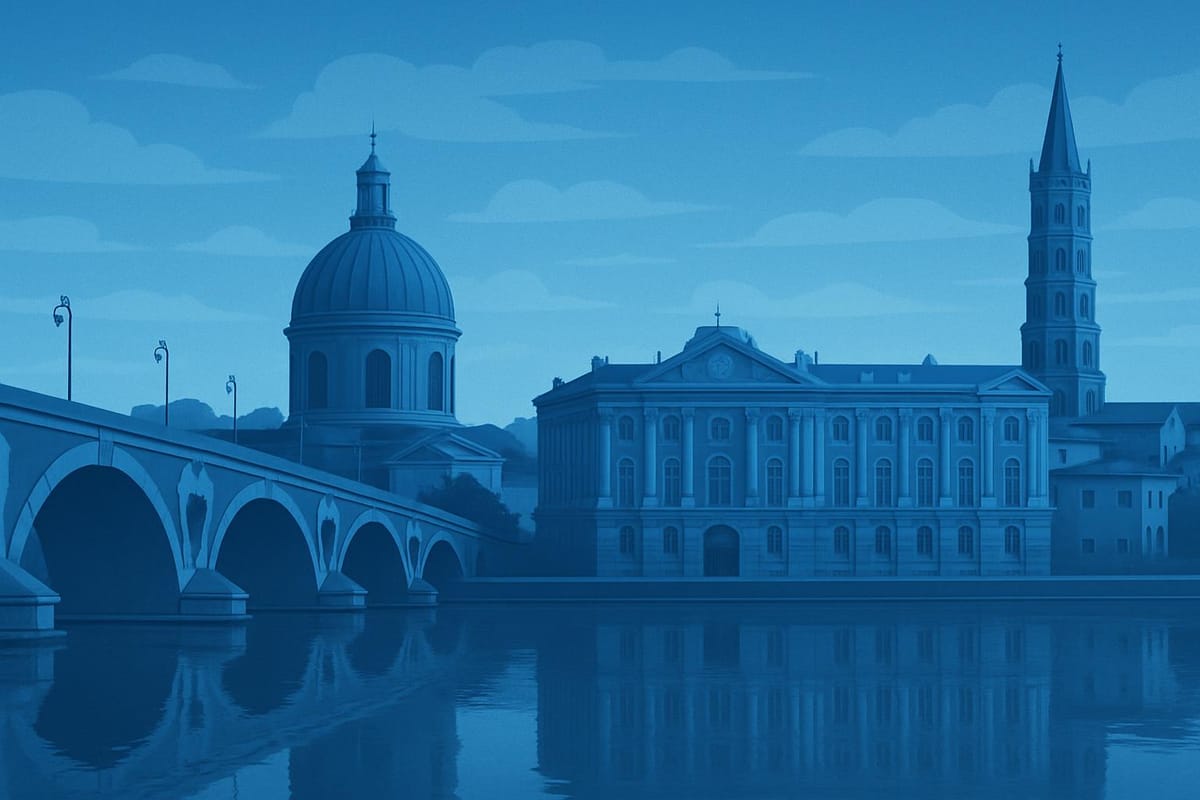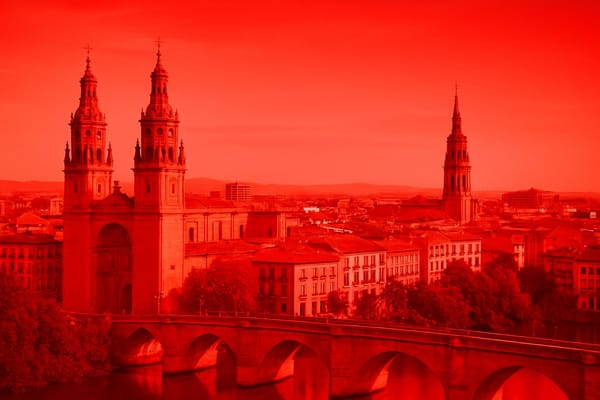Toulouse
Pink terracotta streets, Capitole square, Garonne riverside, aerospace museum & lively gastronomy.

Important things to know about Toulouse
Toulouse, in southwestern France, is a dynamic city where warm Mediterranean climate and a distinctive urban identity blend into everyday life; its nickname "La Ville Rose" comes from widespread pink brick architecture that gives streets and façades a cohesive, sunlit hue, while the Garonne river threads through neighborhoods, shaping promenades and local rhythms without being reduced to a mere landmark. The city’s character is defined by a mix of tradition and modernity: centuries-old residential quarters sit alongside cutting-edge labs and a strong aerospace and high-technology sector that fuels jobs, international connections and a culture of innovation. A large student population, anchored by respected universities and research institutes, keeps the cultural scene youthful and entrepreneurial, which in turn influences cafés, markets and a lively nightlife focused on music, theater and contemporary art. Toulouse’s culinary identity is equally robust, with gastronomy rooted in regional produce, intimate bistros and a love for convivial meals that mirror the slower, social pace of southern France. Urban planning balances dense historic streets with green spaces and riverbanks where community life unfolds, while public transport and cycling infrastructure accommodate both commuters and visitors. Economic diversity, multilingual professional networks and regular cultural programming contribute to a cosmopolitan yet distinctly Occitan sensibility, making Toulouse a city whose atmosphere is simultaneously relaxed and industrious, richly textured by its materials, people and ongoing creativity.
Sightseeing hot-spots in Toulouse
Toulouse is a city of warm brick tones and lively streets, often nicknamed the "pink city" for the terracotta façades that glow at sunset. For first-time visitors seeking the best sightseeing experience, the heart of town around the Place du Capitole is essential: the grand 18th-century façade opens onto a bustling square where cafés and street life meet historic grandeur. Wandering the nearby lanes reveals layers of historic architecture, boutique shops and museums, making it one of the top places to visit for those who want charming urban scenery, photo-worthy corners and a taste of authentic local life.
Among the standout things to do are the ecclesiastical landmarks that shaped medieval Toulouse. The Romanesque Basilique Saint-Sernin, with its towering nave and UNESCO-associated pilgrimage history, is a must-see for art and history lovers, while the cloistered serenity of the Couvent des Jacobins offers another peaceful contrast. For riverside strolls, the banks of the Garonne river and the iconic Pont Neuf provide golden-hour vistas and lively quays ideal for sampling regional gastronomy, from cassoulet to fine local wines. Markets and food halls throughout the city showcase the culinary side of Toulouse and extend the sightseeing into delicious territory.
Beyond the historic center, Toulouse is a modern hub of innovation and culture, with the Cité de l'Espace and aerospace attractions reflecting the city's global role in flight and aerospace industries. Museums, contemporary art spaces and family-friendly science exhibits make the city appealing to diverse travelers, while evenings bring convivial bars, live music and rooftop terraces. Easy public transport and compact walkable quarters mean you can pack many sightseeing highlights into a short stay, making Toulouse a rewarding destination for both cultural exploration and relaxed discovery.
Hotels to enjoy in Toulouse
Exploring hotels in Toulouse reveals a rich mix of options to suit every traveler, from boutique hideaways in the centre-ville to modern business hotels near Gare Matabiau and cozy family rooms close to the Canal du Midi. Whether you're drawn to the pink-hued facades that earned the city its nickname "ville rose" or planning meetings near the Capitole, Toulouse hotels offer convenient access to landmarks like Place du Capitole and lively neighborhoods such as Carmes and Saint-Cyprien. Many properties emphasize guest comfort with amenities like free Wi‑Fi, on-site parking, breakfast included and easy links to Aéroport Toulouse-Blagnac, making them ideal for both short city breaks and extended business stays. Searching for accommodation in Toulouse often brings up a variety of price points and styles - from historic buildings converted into elegant suites to practical budget rooms that prioritize location and value.
When choosing accommodation in Toulouse, consider proximity to public transport and local attractions to maximize your time in the city. Travelers looking for a relaxing stay can opt for hotels that advertise wellness facilities and spa services, while culture-focused guests will appreciate rooms within walking distance of museums, theaters and the vibrant food scene showcasing Toulouse’s culinary specialties. For SEO-friendly travel planning, remember to compare Toulouse hotels by rating, reviews, and features like family-friendly rooms, pet policies, and late check-out options. Ultimately, the right hotel in Toulouse balances comfort, location and character, helping you experience the best of this dynamic southwestern French destination.
Restaurants to try in Toulouse
Toulouse is a city of warm terracotta rooftops and vibrant street life, where restaurants line the narrow lanes and invite both locals and visitors to discover rich French cuisine and inventive modern fare. From bustling bistros near the Garonne to refined dining rooms tucked into historic buildings, the culinary scene blends rustic charm with contemporary techniques; the aroma of slow-cooked cassoulet and freshly baked bread often drifts from open windows. For those wondering where to eat in Toulouse, the diversity ranges from cozy family-run eateries serving local specialties to elegant establishments recognized on lists of the best restaurants in Toulouse. Markets such as Les Halles Victor Hugo feed the city’s chefs with seasonal produce, foie gras, and regional cheeses that shape menus and inspire creative tasting menus and seasonal plates.
Exploring Toulouse restaurants is a journey through gastronomy that balances tradition and innovation, with options for every budget and palate. Food lovers seeking memorable experiences will find everything from hearty southwestern flavors to delicate, Michelin-influenced presentations; several Michelin-starred and critically acclaimed venues offer curated courses that spotlight solely local ingredients. Dining in Toulouse is not just about the food but the convivial atmosphere-wine lists highlighting Languedoc and Southwest vintages, friendly service, and neighborhood cafés that make for lingering meals and conversations. Whether you’re aiming to sample classic dishes or discover avant-garde chefs, the city’s culinary map promises satisfying choices and a genuine taste of southern France.
Best shopping stops in Toulouse
Toulouse is a shopper’s delight, and the shopping highlights of Toulouse, France weave together historic streets, modern department stores, and irresistible boutique finds. Strolling from the grand Place du Capitole down the bustling Rue Saint-Rome reveals a mix of international brands and independent boutiques where fashion, homeware, and artisan goods sit side by side. For those seeking upscale retail, Galeries Lafayette and other department stores offer curated selections of designer labels and regional specialties, while the neighborhoods of Carmes and Saint-Georges are treasure troves for unique fashion, vintage pieces, and concept stores that capture the city’s creative spirit. The combination of the Pink City’s warm brick façades and lively shopping streets makes exploring shops feel like part of the cultural experience rather than a separate activity.
Beyond fashion, the markets and artisan hubs are central to shopping in Toulouse. The famous Marché Victor Hugo tempts food lovers with local cheeses, charcuterie, and Occitan delicacies, perfect for tasting the region before buying exquisite edible souvenirs. Craft shops and galleries throughout the city showcase ceramics, jewelry, and textiles made by local artisans, so finding authentic, locally produced gifts or home accents is easy. For visitors hunting for the best shopping in Toulouse, aim for a mix of market mornings and afternoon browsing in boutique-lined lanes to discover everything from contemporary design pieces to time-honored regional crafts, ensuring a memorable retail experience that reflects Toulouse’s rich culture and culinary heritage.
Nightlife highlights in Toulouse
Toulouse comes alive after sunset, and Toulouse nightlife mixes the charm of La Ville Rose with a youthful, cosmopolitan energy. Strolling from the Capitole to the banks of the Garonne River, evenings often begin with a relaxed apéro on a sunny terrace at Place Saint-Pierre, then flow into a string of intimate bars and late-night cafes. For those searching for things to do in Toulouse after dark, the city offers everything from cozy wine bars in Carmes to rooftop spots overlooking the river, and a lively student scene that keeps the party going through the night. The combination of historic architecture and modern venues gives the nightlife in Toulouse a memorable, photogenic quality that draws both locals and visitors.
Music lovers and night owls will find plenty of options, with venues presenting live music - jazz, rock, and electronic sets - alongside energetic Toulouse clubs pulsing until dawn. Neighborhoods like Saint-Cyprien and Esquirol host small concert halls and eclectic DJ nights, while larger concerts and festival-style events often light up the city calendar. Whether you prefer a quiet cocktail, a bustling bar crawl, or dancing to local DJs, the best Toulouse nightlife experiences blend authentic regional flavors with vibrant entertainment, creating lasting memories for every kind of night out.
Getting around in Toulouse
Toulouse is well served for both air and rail travelers: Toulouse-Blagnac Airport sits just west of the city, around 8 km from the center, and offers frequent options for an easy airport transfer including dedicated airport shuttle buses, taxis, private transfers and car rental, while the city’s integrated Tisséo public transport system makes connections straightforward; once in town, most visitors head to the heart of the network at Gare de Toulouse-Matabiau, the main railway hub where high-speed TGV and intercity services link Toulouse with Paris and major French cities and regional TER Occitanie trains serve destinations across the south and toward the Spanish border. For seamless onward travel, Matabiau connects with the metro at the Marengo–SNCF stop and the wider tram and bus grid so commuters and tourists can reach business districts, the historic center or university areas without hassle. Whether you’re planning a short stopover or a longer stay, the combination of efficient rail links and a compact airport makes Toulouse a practical gateway for exploring Occitanie, and optimizing arrival and departure logistics can save time and enhance your overall trip experience.
Culture must-see's in Toulouse
Toulouse, often nicknamed La Ville Rose, is a vibrant cultural hub in southern France where medieval charm meets modern creativity. Strolling around the Place du Capitole reveals grand pink-brick façades and a lively civic heart that frames the city's theatrical and musical calendar, while the Basilique Saint-Sernin, a UNESCO site, testifies to Toulouse’s deep historical roots. Museums such as the Musée des Augustins and contemporary galleries showcase fine art across centuries, and the river Garonne provides scenic promenades that bring together students, locals, and visitors. Toulouse’s identity is also shaped by its regional Occitan heritage; street festivals, traditional music, and artisan markets keep local crafts and languages alive, offering an authentic cultural experience in the heart of Occitanie.
Beyond its historic landmarks, Toulouse is a center for innovation with cultural institutions like the Cité de l'Espace and aerospace museums reflecting the city's role in European aviation and technology. Culinary culture is equally distinctive: hearty cassoulet, delicate violette sweets, and bustling food markets celebrate southwestern gastronomy, while vibrant cafés and bistros host lively jazz nights and contemporary performances. Annual festivals, theater productions, and the flourishing street art scene add layers to Toulouse’s cultural life, making it a must-visit destination for lovers of history, art, food, and modern science in France.
History of Toulouse
Toulouse, France has a layered and compelling history that stretches from ancient settlement to modern innovation, and the history of Toulouse is a story of resilience and reinvention. Founded as the Roman colony of Tolosa, its strategic position on the Garonne river made it an important crossroads for trade and culture in southern France. During late antiquity and the early medieval period the city passed through the hands of Visigoths and Franks, later becoming the capital of the County of Toulouse and a flourishing center of Occitan language and troubadour culture. The medieval era left an indelible stamp with monuments such as the Romanesque Basilica of Saint‑Sernin and the grand Capitole, while the turbulent 13th century brought the Albigensian Crusade and political shifts that tied Toulouse more closely to the French crown. Complementing its religious and civic architecture, the construction of the Canal du Midi in the 17th century strengthened the region’s economic links and remains one of the engineering achievements that define the city’s heritage. The distinctive pink terracotta used in many buildings, which gave rise to the nickname “La Ville Rose”, continues to attract visitors who come to explore the layers of Toulouse’s past visible in winding streets, fortified gates and cloistered courtyards.
In the modern era the history of Toulouse took a decisive turn as industry, education and aerospace transformed the city into a European hub of technology and research. The University of Toulouse, with medieval origins and modern expansions, anchored a culture of learning that fed scientific and artistic advancement. From railways to factories and from chemical works to high-tech laboratories, Toulouse embraced industrialization while preserving its historic core. The 20th century saw the city serve as both refuge and resistance during periods of conflict, and later as the nerve center of France’s aeronautics and space ambitions: today the Aerospace cluster, led by Airbus, Cité de l’Espace and numerous research institutions, defines a new chapter in the city’s long narrative. This blend of ancient monuments, lively cultural traditions, riverside promenades and cutting-edge technology makes Toulouse, France a city where past and future meet-a destination whose rich historical tapestry continues to shape its identity, economy and appeal to visitors and scholars alike.



